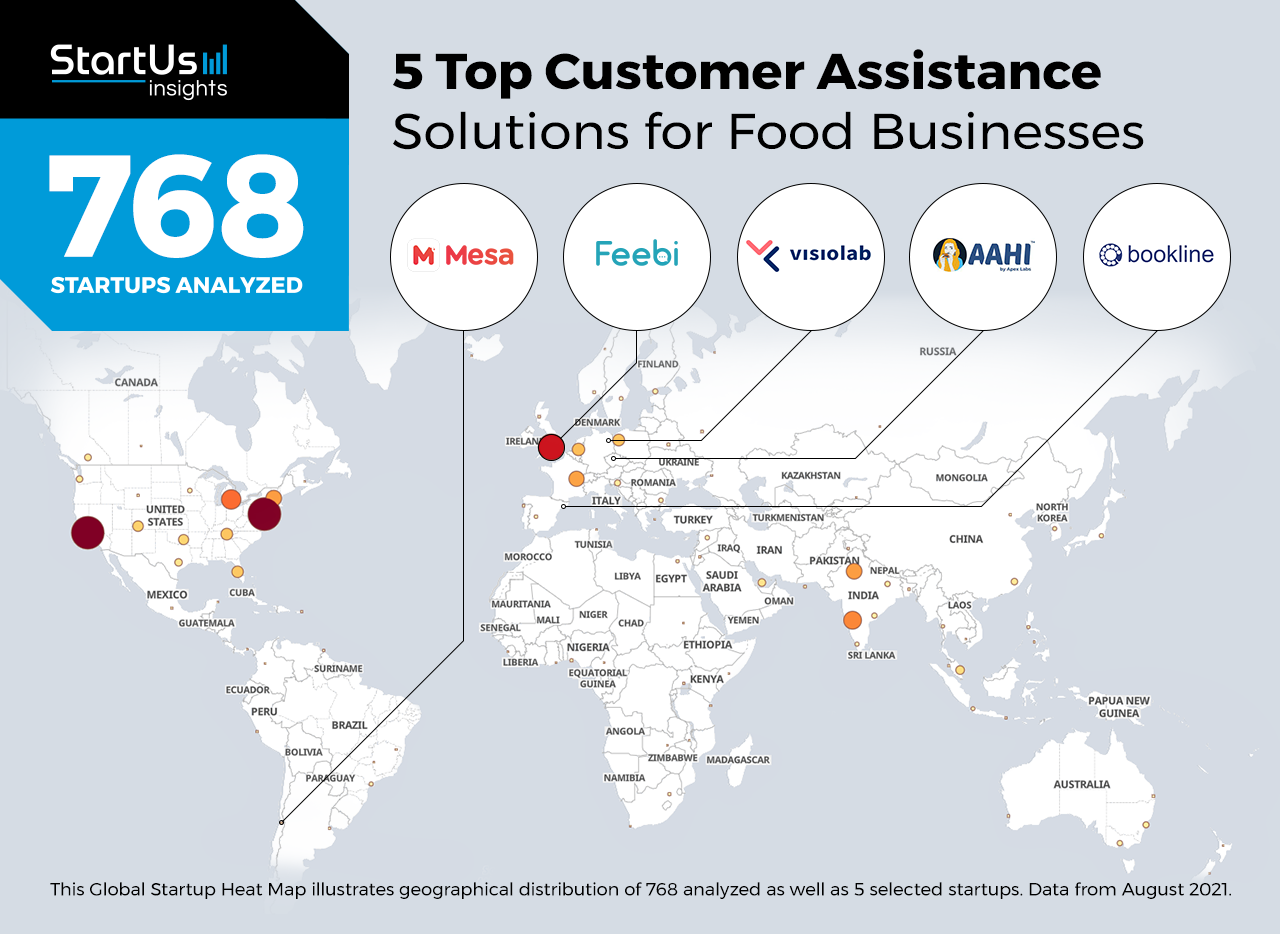Staying ahead of the technology curve means strengthening your competitive advantage. That is why we give you data-driven innovation insights into the food industry. This time, you get to discover 5 hand-picked customer assistance solutions.
Global Startup Heat Map highlights 5 Top Customer Assistance Solutions for Food Businesses out of 768
The insights of this data-driven analysis are derived from the Big Data & Artificial Intelligence-powered StartUs Insights Discovery Platform, covering 2 093 000+ startups & scaleups globally. The platform gives you an exhaustive overview of emerging technologies & relevant startups within a specific field in just a few clicks.
The Global Startup Heat Map below reveals the distribution of the 768 exemplary startups & scaleups we analyzed for this research. Further, it highlights 5 food startups that we hand-picked based on criteria such as founding year, location, funding raised, and more. You get to explore the solutions of these 5 startups & scaleups in this report. For insights on the other 763 customer assistance solutions, get in touch.
Aahi builds a Customer Engagement Platform
Restaurants and bars have multiple customer touchpoints like registration, order placing, and payment. However, post the COVID-19 pandemic, customers and restaurants are looking for contactless measures in every step of the service. For example, technology such as QR codes to access menus, self-ordering, and online payment make restaurants safer. Hence, startups are developing solutions that assist customers to perform tasks swiftly without involving staff.
Czech startup Aahi develops a customer engagement platform for restaurants to assist customers from order selection to payment. The startup’s software enables restaurants to digitize their menu for customers. It provides QR-code-based or near-field communication (NFC)-induced stickers to allow customers to quickly order and pay, without any assistance from restaurant staff. The software also assists customers in order selection by providing them access to ratings and previous feedback.
Feebi develops Customer Service Chatbots
Restaurants lose a considerable number of customers due to unresponded calls. It is difficult for restaurant employees to attend every call manually. Hence, third-party customer assistance platforms are gaining in popularity as they enable restaurant managers owners to reply to every query. Such solutions also increase sales for restaurants and improve the overall customer experience. Startups develop platforms that record restaurant-specific information and reply to customers for the respective questions.
British startup Feebi is a smart restaurant chatbot that answers a significant portion of all online customer queries – from dietary requirements to restaurant facilities. Feebi, the startup’s chatbot, uses natural language processing (NLP) and machine learning to recognize the questions. Restaurants fill in the basic details and connect the Feebi account to their online social media channels. It also links up with the table reservation software, enabling quick and easy booking from the website and social media. The solution assists customers to get instant information about the restaurant without waiting for human assistance.
Bookline offers Telephonic Booking
Although there are many online aggregator platforms that provide online reservations, a majority of customers still prefer calling. But currently, telephonic service by restaurant owners is inefficient as employees remain busy in the dining room or closed between shifts. Hence, startups develop platforms that automate reservations through phone calls on behalf of restaurants and ensure every customer query is replied to.
Spanish startup Bookline develops a virtual switchboard for restaurants that automates reservations. The startup’s virtual private branch exchange (PBX) solution responds to the client queries over call on behalf of the restaurant. The bilingual solution fully understands customer requirements and performs searches to provide solutions accordingly. The robotic virtual assistant is also a switchboard that transfers calls between different departments within the restaurant or hotel using voice commands. The extension assists customers to make decisions and get immediate responses about any service-related issues.
Mesa informs Customers about Restaurant Discounts
Restaurants are adopting new ways to optimize their revenue during downtime, including discounts, coupons, and others. But many potential customers still remain uninformed about it. Hence, startups develop online platforms that collect offer updates from restaurants and notify customers about the restaurant discounts. This enables customers to grab the deals and make the best choice for going out. It also helps restaurant owners maximize revenues during downtime.
Chilean startup Mesa develops a mobile application that allows customers to explore discounts during off-peak hours and make reservations. The application targets people who prefer less-traffic timings that too with a discounted price. The app automatically generates dynamic discounts according to the timings. Further, the solution uses the yield management strategy to offer dynamic prices based on demand to attract customers during off-peak hours.
VisioLab provides Real-Time Nutrition Information
As the customers are becoming calorie conscious, they constantly search for nutritional information in food packaging or try to guess it in restaurants. Even if restaurants provide this information, it can sometimes be misleading since the menu keeps changing. To solve this issue for customers, startups use artificial intelligence (AI) and computer vision to develop customer assistance software. These solutions provide real-time nutrition information in addition to other information about the product or food.
German startup VisioLab develops an AI-powered computer vision platform for canteens and caterers. The solution enables customers to get real-time nutrient information about what’s on their plate by scanning it under the system. The startup uses AI to visually identify food items and augment the required details over the item. Customers then receive nutrition details, interact with the canteen, and view the plan for the next few days to confirm when items will be available next. It also displays the food prices and enables checkout without requiring any staff or registers.
Discover more Food Tech Startups
Food startups such as the examples highlighted in this report focus on restaurant digitalization, food recommendations, and food ordering. While all of these technologies play a major role in advancing the food industry, they only represent the tip of the iceberg. To explore more food technologies, simply get in touch to let us look into your areas of interest. For a more general overview, you can download our free FoodTech Innovation Report to save your time and improve strategic decision-making.



![Food and Beverage Industry: Top 10 Technology Trends [2025 & Beyond]](https://www.startus-insights.com/wp-content/uploads/2024/11/Food-and-Beverage-Industry-Trends-SharedImg-StartUs-Insights-noresize-420x236.webp)






